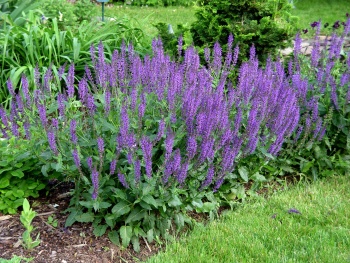Salvia Officinalis
From Wikiwel
Other names : Salvia officinalis, Common Sage, Dalmatian Sage, Feuille de la Bergère, Garden Sage, Herbe Sacré, Meadow Sage, Salvia lavandulaefolia, Salvia officinalis, Sauge, Sauge Ananas, Sauge des Prairies, Sauge Divinatoire, Sauge Divine, Sauge Domestique, Sauge Officinale, Scarlet Sage, Spanish Sage, True Sage, Vraie Sauge.
See also : Salvia
Special Precautions of Sage
- Sage is LIKELY SAFE in amounts typically used in foods. It is POSSIBLY SAFE when taken by mouth or applied to the skin in medicinal amounts short-term (up to 4 months).But don’t use sage in high doses or long-term. Some species of sage contain a chemical called thujone that can be poisonous if you get enough. This chemical can cause seizures and damage to the liver and nervous systems. The amount of thujone varies with the species of plant, the time of harvest, growing conditions, and other factors.
- Pregnancy and breast-feeding: Taking sage during pregnancy is LIKELY UNSAFE because of the possibility of consuming thujone, a chemical found in some sage. Thujone can bring on a woman’s menstrual period, and this could cause a miscarriage. Avoid sage if you are breast-feeding, too. There is some evidence that thujone might reduce the mother’s milk supply.
- Diabetes : Sage might lower blood sugar levels in people with diabetes. Watch for signs of low blood sugar (hypoglycemia ) and monitor your blood sugar carefully if you have diabetes and use sage. The dose of your diabetes medications may need to be adjusted by your healthcare provider.
- High blood pressure: Sage can increase blood pressure in some people with high blood pressure. Be sure to monitor your blood pressure.
- Seizure disorders: One species of sage (Salvia officinalis) contains significant amounts of thujone, a chemical that can trigger seizures. If you have a seizure disorder, don’t take sage in amounts higher than those typically found in food.
- Medications for diabetes (Antidiabetes drugs) interacts with sage.
- Medications used to prevent seizures (Anticonvulsants) interacts with sage.
- Sedative medications (CNS depressants) interacts with sage.
The benefits of Sage are
This aromatic herb is loaded with antioxidant and anti-inflammatory compounds. It can improve digestion which soothing muscle cramps, calming down bouts of diarrhea and can also help fight off colds and flus.
- Sage has a proven history at boosting memory.
- Sage may also be helpful for those suffering from Alzheimer's Disease.
- balancing menopausal and PMS symptoms :There's some evidence that sage leaves may be beneficial for reducing hot flashes.
- sage essential oil is may protect genetic material from damage. This exciting advancement could help in the prevention and treatment of genetic diseases as well as diseases with a genetic component like cancer, heart disease and others.
- Sage tea may help keep cholesterol in check : healthy female volunteers showed a reduction in LDL ("bad") cholesterol and an improvement in total cholesterol levels. The study also found that sage tea may help increase antioxidants activity.
- Sore throat beacuse it contains tannins.
- Cold Sores : when applied as a cream containing sage and rhubarb. Applying a cream containing sage and rhubarb (Rheum officinale and Rheum palmatum) to cold sores may be about as effective as acyclovir (Zovirax) cream. Acyclovir cream heals the cold sores in about 6 days; it takes the sage and rhubarb cream about 7 days to heal them. Sage and rhubarb together work faster than sage alone.
- Respiratory Diseases : Essential oils are the source of the many benefits of sage tea for lung problems and common respiratory ailments. The rich aromatic properties arising from sage's volatile oils of thujone, camphor, terpene and salvene can be put to use by inhaling sage tea's vapors to dispel lung disorders and sinusitis. Alternatively, brew a strong pot of sage tea and place it into a bowl or a vaporizer.
- Burning sage (smudging) is an ancient Shamanic practice that is thought to help remove the negative spirits and energies that are trapped in a space. Smudging is typically practiced in homes or offices; however, you can also smudge your body and the objects around you. Native Americans considered this plant sacred and burn it as a purifier in ceremonies
- Sage tea is a traditional treatment for sore throats and coughs
Main Combinations
Menopause problems : Red Clover + Alfalfa + Salvia
